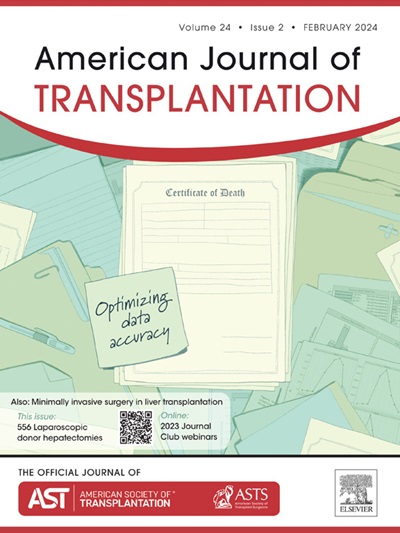The impact of sodium-glucose cotransporter-2 inhibitors on dialysis risk and mortality in kidney transplant patients with diabetes
IF 8.2
2区 医学
Q1 SURGERY
引用次数: 0
Abstract
Kidney transplantation is the optimal treatment for end-stage kidney disease, but many patients also have diabetes mellitus. This study compares long-term outcomes between new users of sodium-glucose cotransporter-2 inhibitors (SGLT2i) and dipeptidyl peptidase-4 inhibitors (DPP-4i) in kidney transplant recipients with diabetes mellitus. Data from the TriNetX Collaborative Network, including 89,710 patients with diabetes mellitus who underwent kidney transplantation between January 1, 2015, and June 30, 2023, were analyzed. From this cohort, 1410 matched pairs of SGLT2i and DPP-4i users were selected based on propensity scores. The results showed that SGLT2i users had a lower risk of dialysis (hazards ratio: 0.694) and all-cause mortality (hazards ratio: 0.687) compared with DPP-4i users. There were no significant differences in the risk of posttransplant infections, transplant rejection, or hospitalization between the 2 groups. Additionally, SGLT2i users had significantly lower cumulative incidences of dialysis and mortality. In conclusion, this study, using data from TriNetX, demonstrated that SGLT2i treatment in kidney transplant recipients with diabetes mellitus is associated with lower risks of dialysis and mortality, suggesting it may help preserve kidney function and improve survival in this population.
钠-葡萄糖共转运蛋白-2抑制剂对肾移植糖尿病患者透析风险和死亡率的影响
肾移植是治疗终末期肾病的最佳方法,但许多患者同时患有糖尿病。本研究比较了新使用钠-葡萄糖共转运蛋白-2抑制剂(SGLT2i)和二肽基肽酶-4抑制剂(DPP-4i)的糖尿病肾移植受者的长期预后。来自TriNetX协作网络的数据,包括2015年1月1日至2023年6月30日期间接受肾移植的89710例糖尿病患者,进行了分析。从这个队列中,根据倾向得分选择了1410对匹配的SGLT2i和DPP-4i使用者。结果显示,与DPP-4i使用者相比,SGLT2i使用者的透析风险(HR: 0.694)和全因死亡率(HR: 0.687)较低。两组患者在移植后感染、移植排斥或住院的风险方面没有显著差异。此外,SGLT2i使用者的累计透析发生率和死亡率显著降低。综上所述,本研究利用TriNetX的数据,证明SGLT2i治疗与糖尿病肾移植受者较低的透析风险和死亡率相关,表明它可能有助于保护肾功能并提高该人群的生存率。
本文章由计算机程序翻译,如有差异,请以英文原文为准。
求助全文
约1分钟内获得全文
求助全文
来源期刊
CiteScore
18.70
自引率
4.50%
发文量
346
审稿时长
26 days
期刊介绍:
The American Journal of Transplantation is a leading journal in the field of transplantation. It serves as a forum for debate and reassessment, an agent of change, and a major platform for promoting understanding, improving results, and advancing science. Published monthly, it provides an essential resource for researchers and clinicians worldwide.
The journal publishes original articles, case reports, invited reviews, letters to the editor, critical reviews, news features, consensus documents, and guidelines over 12 issues a year. It covers all major subject areas in transplantation, including thoracic (heart, lung), abdominal (kidney, liver, pancreas, islets), tissue and stem cell transplantation, organ and tissue donation and preservation, tissue injury, repair, inflammation, and aging, histocompatibility, drugs and pharmacology, graft survival, and prevention of graft dysfunction and failure. It also explores ethical and social issues in the field.

 求助内容:
求助内容: 应助结果提醒方式:
应助结果提醒方式:


